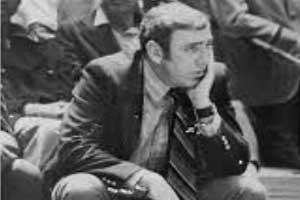Jack Magee (1966-1972)
To some fans, the name of Jack Magee is a trivia question, a reference to the seismic shift of Georgetown basketball before and after 1972, the date of John Thompson's hiring. His six seasons set the course for the changes to follow.
Born In New York, Magee came to prominence as a guard at Boston College, leading the Eagles to its first ever NCAA invitation in 1958, his junior season. Magee averaged 13.3 points per game as a senior as the Eagles finished 17-9, but narrowly missed a post-season berth.
Following military service, Magee returned to Chestnut Hill in 1961 as the Eagles' freshman coach, and became an assistant under head coach Bob Cousy for three seasons, beginning in 1963.
Following a letter of recommendation from Cousy, the 29 year old Magee was offered the head coaching job at Georgetown job after a lingering 56 day search to succeed Tom O'Keefe--no college coach applied for the job and two prominent high school coaches in the Washington area, Joe Gallagher and Morgan Wooten, declined to pursue it.
Unlike O'Keefe, who was seen as a player's coach, Magee was frank and could be combative by comparison. At the outset, he said his team wasn't very good, going so far as to tell a Boston newspaper that he was looking for help from the intramural ranks. Magee complained about the funding of the program, and cited a meager recruiting budget for failing to extend Georgetown's recruiting beyond the Catholic high schools of the New York area. Ongoing disagreements with Robert Sigholtz, Georgetown's athletic director from 1969-1972, formed a backdrop of controversy for much of Magee's tenure.
Magee posted a 35-35 record after his first three seasons. While there were some strong individual performances, the Hoyas were not deep enough to withstand tougher teams, and its 12-23 record on the road was evidence of same. By his fourth season in 1969-70, a senior-led squad and the arrival of sophomores Art White and Mike Laughna propelled the Hoyas forward to its best season in a generation, with its most home wins to date in school history (12) and an 18-7 record, earning the Hoyas its first NIT bid in 17 years. Despite Magee's offer of a pay cut in exchange for a long term contract after the season, Sigholtz offered only a two year extension. Magee later reported that he turned down the Fordham job that eventually went to Richard (Digger) Phelps, and he signed a two year extension to remain at Georgetown.
Unfortunately, the Hoyas returned to form in 1970-71, finishing 12-14 and well beyond a return visit to the NIT. The player-coach relationship was reported as difficult particularly with leading scorer Art White, who subsequently quit the team that spring.
"I know I'll be on the spot next year and it's not right," Magee told The HOYA. "You know the situation here and what we're working against...On our schedule this year, 24 of the [26] teams have bigger staffs and 23 have bigger recruiting budgets than we do. But win-lose is the name of the game for a coach here."
With seven lettermen lost from 1971 and four of its top five scorers, Sigholtz set up Magee for failure in 1971-72. The athletic director scheduled the Hoyas for nine consecutive road games over a five week period in December and early January, with opponents such as #2-ranked Marquette, Wisconsin, Texas, San Francisco, and LSU, all out of Georgetown's league. The Hoyas dropped all nine en route to a program low 3-23 mark, finishing 0-16 on the road. Magee resigned under pressure on Feb. 8. For his part, Sigholtz was forced out ten days later.
A 1986 inductee of the Boston College Varsity Club Hall of Fame, Jack Magee served for two decades with the U.S. Department of Transportation. Now retired, he lives in Fairfax, VA.
| Year | Post-Season | Record | Pct. | Home | Away | NCAA/NIT |
| 1966-67 | 12-11 | 0.522 | 7-4 | 5-7 | ||
| 1967-68 | 11-12 | 0.478 | 9-4 | 2-8 | ||
| 1968-69 | 12-12 | 0.500 | 7-4 | 5-8 | ||
| 1969-70 | NIT | 18-7 | 0.720 | 12-1 | 6-5 | 0-1 |
| 1970-71 | 12-14 | 0.462 | 7-4 | 5-10 | ||
| 1971-72 | 3-23 | 0.115 | 3-7 | 0-16 | ||
| Totals | 68-79 | 0.472 | 45-24 | 23-54 | 0-1 |
